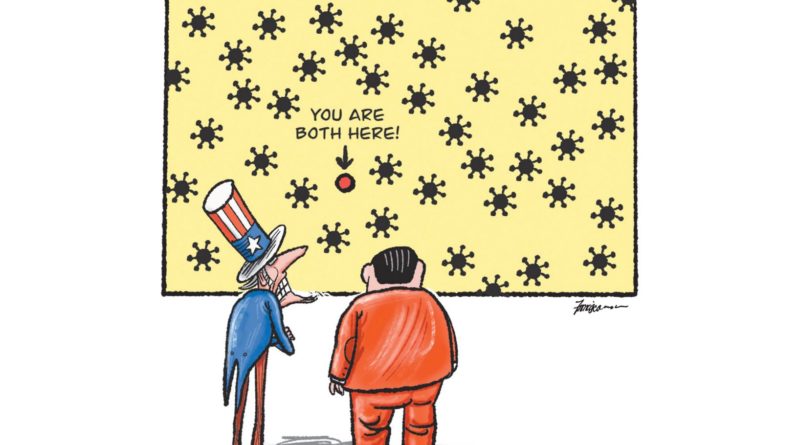OP ED: Impact on US-China rivalry
COVID-19 SPECIAL: Global Affairs
The myth of the pandemic’s impact on US-China rivalry
.
.
.
LONDON • “I spoke with Angela Merkel today, I spoke with Prime Minister Abe of Japan, I spoke with many of the leaders over the last four or five days,” US President Donald Trump claimed last week.
“And so many of them, almost all of them – I would say all of them, not everyone would want to admit it – but they all view us as the world leader, and they’re following us,” he added.
The reality, of course, is precisely the opposite: Although America’s closest allies would dearly like to see the US take on a leading role in handling both the current health crisis and the oncoming economic one, few believe either will happen while Mr Trump is in charge.
Indeed, the very fact that Mr Trump had to make such a claim of world leadership is in itself telling: Even this US President – who has spent most of his time in the White House dismissing his country’s system of alliances as just an expensive irrelevance – now seems to grasp that he has to do something to reassert America’s global standing.
For a consensus is now emerging among both analysts and diplomats worldwide that the coronavirus pandemic has greatly hastened both America’s inevitable decline and China’s irresistible rise.
Just look at the coronavirus mortality figures in the US, as the country’s seemingly dysfunctional political system appears unable to grapple with the challenge. And compare this – the argument goes – with the current conditions in China, where the pandemic appears to have been swiftly brought under control, and the economy is now already bouncing back. The contrast is obvious. And, allegedly, there is no doubt who has the upper hand.
But chances are high that the current US decline/China rise narrative is wrong. A much more plausible scenario is that both the US and China will emerge seriously weakened from the events this year.
The only outcome, which by now seems inevitable, is that the tensions between the two powers will grow, become entrenched, and ultimately loom over our lives for decades to come.

BITTER BLOW TO THE US
There is no question that the US has suffered a bitter blow. The problem is not just America’s handling of the pandemic: Although infection and mortality figures are very high, in terms of ratios per million inhabitants, America’s death rates at the moment are barely half those recorded in key European countries and – again, compared with its population – the US coronavirus infection rates are roughly comparable to those registered in Singapore, for instance.
Rather, the biggest blow comes to America’s reputation as an efficient functioning superpower. The bitter spats between individual states and the US federal government, and the bizarre sight of a president who muses in public about the possibilities of injecting people with disinfectant or “illuminating” them from inside their bodies has done America no good at all.
And the sight of US aircraft carriers stricken with disease in mid-ocean, while China’s navy and its new aircraft carrier continue to sail unhindered, has not helped either.



Meanwhile, the US economy is slated to shrink by the biggest single figure since the end of World War II, and Washington’s pledges for government spending are already pushing the US’ ratio of public debt to gross domestic product towards the records that are known only in wartime.
The US military is still outspending the armed forces of any other nation by a long mile, but the economic crunch is sure to constrain future spending. And that’s without factoring in a potential global financial crisis. In short, both in terms of global standing and future capabilities, things don’t look promising for Uncle Sam.

CHINA’S PROSPECTS
But neither do China’s prospects look particularly rosy. Even if the latest economic statistics published in Beijing are believed, chances are still very high that the country will register by the end of this year its worst economic performance in half a century.
For the first time, China will also have to contend with severe economic contractions in both North America and Europe at the same time, its two top markets that between them account for more than a quarter of all Chinese trade; it’s fanciful to believe that this won’t have an impact on China’s well-being.
There is also the considerable blowback to China from its investments in Belt and Road Initiatives around the world; most of the debts contracted on these gigantic and often loss-making projects primarily in Asia and Africa will turn sour, and will have to be rolled over.
And despite the cheerful note struck by the leadership in Beijing, the fact remains that China’s global charm offensive has fallen flat.
Strong-arm tactics in Europe, where the Chinese pushed to be recognised as better than the Americans in providing humanitarian help, coupled with a very obvious Chinese attempt to denigrate the validity and efficiency of Europe’s political systems, have only increased the Europeans’ dissatisfaction.
Just a few years ago, plenty of European politicians were viewing China as just a massive economic opportunity; now, most of the discussion in European capitals is about China as a “systemic rival”.
Nor are the Chinese doing well with the African continent, where nations are outraged by TV footage of Africans who were apparently maltreated in China. And in the US itself, China’s “soft power” appeal – which used to be considerable – has largely disappeared. Latest opinion polls indicate that over two-thirds of ordinary Americans have a negative image of China.

LACK OF LEADERSHIP
So, what we are witnessing here is not so much the fall of one titan and the rise of another, but two titans who have both suffered serious blows and are in no position to exercise the sort of global responsibilities to which they both pay lip service.
And to make matters worse, the opportunities for a new workable arrangement between these two giants are also diminishing fast.
When Mr Trump first entered the White House in early 2017, his talk about the need to decouple the US economy from its dependence on value chains stretching to China was dismissed around the world as not merely outlandish and self-defeating, but also economically illiterate.
Today, however, the need for some form of decoupling from China is not merely discussed as a possibility between key Western trading nations, but often seen as an inevitability.
Irrational – and sometimes even racist-motivated – fears about a powerful China are one explanation for this about-turn. But China itself shares some blame for encouraging the trend towards decoupling by emphasising during the current pandemic just how dependent other countries are on Chinese production lines, and what this may mean in political terms.
The US and Europe now import virtually all common antibiotics from China, along with a high percentage of other essential generic drugs and ingredients used to make other medicines.
China could have held up this dependency as a positive aspect, as a key example of why countries should cooperate, particularly when it comes to a health emergency. Instead, a commentary in the official Xinhua news agency warned that if Washington does not desist from its anti-Chinese criticism, “the United States would sink into the hell of a novel coronavirus epidemic”, because China could respond by cutting pharmaceutical exports. The Europeans were also periodically warned of a similar fate.
In the past, Beijing used to warn – and rightly so – about the danger of “weaponising” trade relations. But over the past few months, that’s what China itself has done.
So the Chinese should not be surprised that all the talk in Europe and the US today is about how to rewire supply routes, how to create strategic stockpiles and how to incentivise companies to repatriate manufacturing chains or diversify these away from China.
Nobody believes that a total decoupling of supply and manufacturing chains is either feasible or desirable. And there are serious debates about what manufacturing capabilities should be national, and which ones could remain global. But decoupling as a concept is now an accepted goal.
And it’s the broader shift in the intellectual mood because of the pandemic, which is probably more profound and long-lasting.
In the US, it is no longer taboo to question the very premise of global trade. “Globalisation is not an unstoppable natural force, propelled solely by technological progress and autonomous market forces,” wrote Professor Aaron Friedberg of Princeton University in a recent seminal study, “instead, it is a man-made phenomenon with contours shaped by the choices of states as well as firms.”
He claims that the main premises of globalisation – the assumption that the growth of China is a benign phenomenon, and that what is good for US private companies is also good for the US government – no longer apply.
Although the Europeans are still broadly in favour of globalisation, they too are reinterpreting the concept in a more restrictive way. “Globalisation is not based on straightforward, fluid networks to which everyone has access, but on strategic hubs dominated by certain stakeholders, who can control or block them to their advantage in the event of a crisis,” wrote Mr Josep Borrell, the European Union’s foreign policy chief, in a recent policy paper that deserves greater attention.
None of this means that the US and China are inevitably heading towards a “cold war” or even a hot one. Nonetheless, there is no question that some of the features of the old Cold War will return.
Trade decoupling will create some winners as US and European manufacturers diversify away from China. But it will also create plenty of losers and will force many countries to choose between China and the US, a binary choice few are currently prepared to make.
Yet unlike the Cold War, a period during which the two superpowers exercised great control over their allies, neither the US nor China can do so now. So, the future belongs to a more disorganised and fragmented world, one in which both great and mid-ranking powers hold sway in different ways.
None of this is either promising or particularly attractive. Yet it may be the more realistic scenario.
Read the latest on the Covid-19 situation in Singapore and beyond on our dedicated site here.
Get The Straits Times app and receive breaking news alerts and more. Download from the Apple App Store or Google Play Store now.
Ted Luke Sin

SIGN UP TO RECEIVE OUR EMAIL
The most important news of the day about the ASEAN Countries and the world in one email: [email protected]












